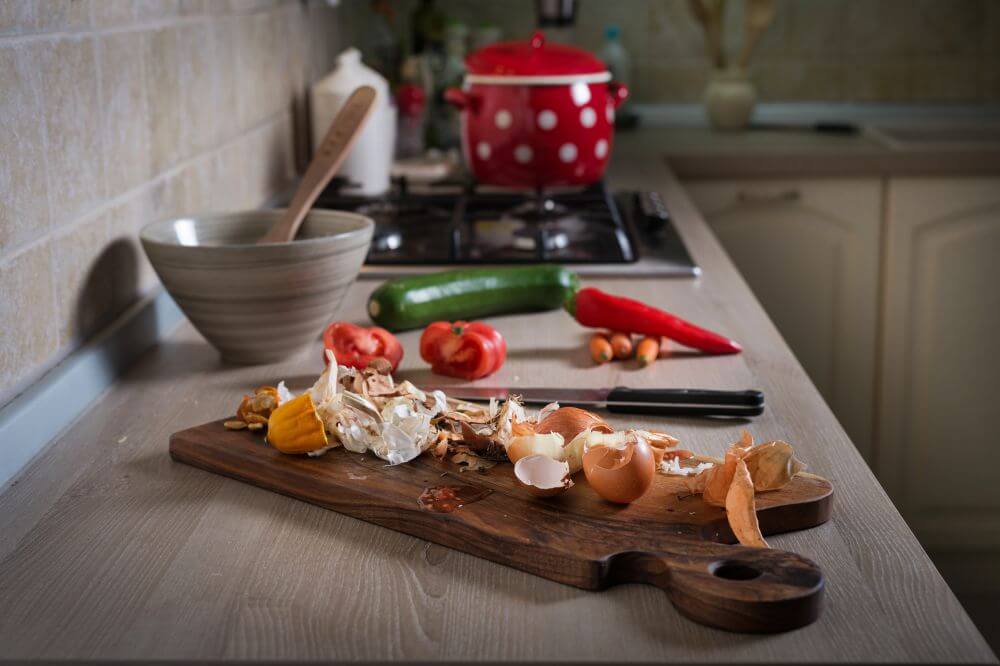10 food scraps to add to your garden

Did you know that some of the food scraps that you are throwing in your rubbish bin could be beneficial for your garden?
While most foods should be composted before being applied to your garden, there are some which you can add directly to your garden.
Here are 10 food scraps that you can add to your garden without composting:
Banana Peels
Banana peels are nutrient powerhouses containing calcium, magnesium, sulphur, phosphate, potassium and sodium.
Cut your banana peels into pieces and add directly to the surface of the ground or bury down to 10 centimeters deep, around the base of the plant. Be careful not to disrupt the soil where your plant’s roots are.
Banana peels can also be soaked in water for 48 hours or blended with water and the resulting liquid can be used to water plants for a quick nutrient boost for your plants. Your roses will thank you for adding banana peels!
Onion and Garlic
Pieces of onion and garlic help ward off pests like hedgehogs, mice and rats from your garden.
Apply to the surface of the soil in small pieces in the area where pests are a problem.
Tea Leaves
Tea leaves can be applied to the surface of your soil to give your plants an extra boost of nitrogen, which is particularly useful for fast growing plants.
Only use teabags that are made of 100% natural fibers if you are adding the teabag itself to the garden. If the bag is not compostable then remove the tea from the bag and only spread the tea leaves themselves.
Worms love tea leaves and it also helps with soil aeration, drainage and water retention.
Egg Shells

Crushed egg shells are a great organic deterrent for snails and slugs. To use them, crush them and place them on the surface of the soil in a circle around the base of each plant, with no breaks in the circle.
Egg shells are also a good source of calcium, which can help reduce soil acidity when used in large amounts. The egg shells can be mixed in with compost or mixed directly into the soil.
Egg shells should not be buried or placed around root vegetables because there is a risk of your vegetables being contaminated by salmonella by those eggs
Nut Shells
Because nut shells break down slowly, they make a good surface mulch which helps to aerate the soil. Crush the nut shells before applying them to the surface.
While it does take a large amount of nut shells to create a sufficient surface mulch, you can still add small amounts of nut shells to your garden because it is better to let them break down and become soil over time than to throw them in the bin to be taken to a landfill.
Coffee Grounds

Empty your coffee pot into the garden and your plants will love you for it. Rich in nitrogen, phosphate and potassium, coffee grounds help improve the drainage, water retention and aeration of the soil.
You can add it directly to the surface of your garden or mix it in with the soil.
Large amounts can increase soil acidity, so do not apply large quantities of it to plants that prefer basic or neutral pH conditions, however, it is good for acid loving plants like citrus, roses and blueberries.
Oyster Shells
Oyster shells are rich in calcium and help to reduce soil acidity. If possible, try to crush them before adding them to your soil.
Cooking Water
Whilst not technically a food scrap, that water used for boiling vegetables and eggs is more useful going on your garden than down the drain. Not only does it save water, it is also rich in nutrients.
Citrus Peels

If you have a problem with unwanted cats in your garden, citrus peels will help to ward them off as the smell of the citrus peel is not appealing to cats. Apply to the surface of the soil in small pieces in the area where pests are a problem.
They are also useful for keeping slugs off your plants – hollowed out and upside down citrus peels attract slugs.
Fish Heads and Frames
Any fishing enthusiast will know that keeping the heads and frames and burying them in the garden can work wonders.
Not only are they a great source of nitrogen, they also help to speed up plant growth.
Make sure you bury these in the garden to keep them from attracting pests.
If you are a gardener but don’t fish yourself, check out this website which connects you with people who have fish heads and frames to give away.
Note: Burying uncomposted materials is not always good for your plant’s health, it is safer to apply the uncomposted material to the surface so that it can break down more easily